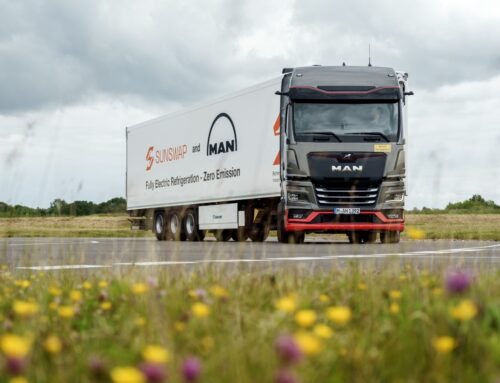Plea for more time on DVS changes
 Transport for London (TfL) is facing calls from industry to extend the timeframe for the introduction of more stringent safety equipment requirements for HGVs which fall below the necessary Direct Vision Standard (DVS) threshold.
Transport for London (TfL) is facing calls from industry to extend the timeframe for the introduction of more stringent safety equipment requirements for HGVs which fall below the necessary Direct Vision Standard (DVS) threshold.
From 28 October, the Progressive Safe System (PSS) will be launched for HGVs of more than 12 tonnes gross weight operating in the capital, which will apply to vehicles that score fewer than three stars under TfL’s DVS scheme.
DVS’s star rating system reflects the levels of direct vision that drivers have of their surroundings from the cabs of individual vehicle types, its aim being to drive up safety for vulnerable road users (VRUs) such as pedestrians and cyclists. Vehicles failing to meet the increased threshold will need the PSS.
Among the requirements of the PSS will be the fitment of a camera monitoring system (CMS) to the vehicle’s nearside; Class V and VI mirrors, a replacement CMS or combination of the two fitted to the front and nearside; a blind spot information system ensuring full coverage down the nearside of rigid vehicles to detect VRUs, which must not activate in relation to roadside furniture or stationary vehicles; and a moving off information system (MOIS) fitted to the front of the vehicle. A full rundown of the requirements is available here, at TfL’s website.
But earlier this month, the Road Haulage Association (RHA) expressed its concern about the timescales imposed by Tfl.
“The new rules are causing a lot of uncertainty for firms entering and operating in London and we’re campaigning hard to ensure our industry’s voices are heard,” said the association.
“Together with Logistics UK and the Association of International Courier & Express Services, we have been extensively lobbying TfL and London Councils.
“Hauliers affected by the upcoming changes consistently tell us that practical implementation of the new requirements from October are hugely challenging and in many cases not feasible.”
The RHA says concerns range from whether enough equipment is available ahead of the deadline, to whether sufficient qualified technicians are available to install it.
“It’s worth reminding ourselves that there’s a widening shortage of heavy vehicle technicians available to service our commercial vehicle fleets across the country – something we’re working hard to tackle through lobbying government,” the organisation added.
“This all comes against the backdrop of affordability – especially for smaller businesses. The cost-of-living crisis is squeezing our industry and we’re seeing a huge number of hauliers going bust.
“More than 450 haulage firms went under last year – twice those in 2022 – amid rising operating costs (nearly 10 percent, excluding fuel) and significant falls in freight volumes (10 per cent).
“We’ve warned that firms unable to comply in time might stop serving London at short notice which could lead to unforeseen problems in the capital’s supply chain and therefore its wider economy.”
It has already been established that a three-month grace period will be available from 28 October for operators who can demonstrate they have taken steps to arrange fitments – though TfL has recently completed a survey of operators assessing market readiness to decide whether an extension to this grace period is required, and is currently analysing feedback.
RHA has called for “a reasonable extension” to the grace period to allow PSS equipment manufacturers more time to supply the sector, and also urged TfL “to announce that existing vehicles would not have to be retrofitted with new kit – instead phasing in the criteria so that new trucks will be fitted with the equipment through natural fleet replacement cycles”.
Brigade Electronics, a major provider of safety equipment to the road transport sector, has also expressed the view that fleets need more time to meet DVS requirements, especially in light of the more sophisticated technology now required.
 “The PSS requires a significant shift in technology,” said Emily Hardy, marketing manager UK for Brigade (pictured, right).
“The PSS requires a significant shift in technology,” said Emily Hardy, marketing manager UK for Brigade (pictured, right).
“Unlike the previous safe permit, which required obstacle detection systems on the nearside, PSS demands technology that can predict collisions based on the trajectories of the vehicle and the vulnerable road user (VRU). This prediction is crucial in determining if a collision is imminent.
“Furthermore, the system includes a specified alarm strategy designed to alert the driver to the severity of the situation. Moreover, some technologies fitted to meet the current DVS requirements will not be applicable from the October deadline.
“However, the unprecedented demand for safety systems in the last few months means many operators will struggle to meet TfL’s deadline. In addition, component shortages have hit hard – a problem that extends beyond the HGV sector – and all safety technology installations must be signed off by a competent installer.”
She continued: “It is our opinion that an extension is required because of the sheer volume of vehicles that will need to be fitted – currently estimated to be in the region of 210,000 vehicles – as well as the late release of the final technical specification and the shortage of fitters in the industry.
“For example, the PSS requires a sensor system at the front. The front system requires two alarms: one when the driver detects a VRU when preparing to move off and one when the vehicle detects a VRU as it has begun its forward manoeuvre. A front detection system was previously recommended but not mandatory and so few operators fitted it.”
Brigade also highlights the issue of confusion throughout the industry regarding the requirements.
“Brigade has had its products independently tested but the DVS spec does not require this,” said Emily Hardy.
“Manufacturers are being allowed to test their products in-house, which Brigade’s experts feel is inadequate and, in effect, marking your own homework.
“We are advocating for a phasing-in period because even a six-month grace period would not be enough. It is our opinion that vehicles that have only had products fitted for a year should have their permits extended, so newer vehicles with no equipment can be prioritised.”










